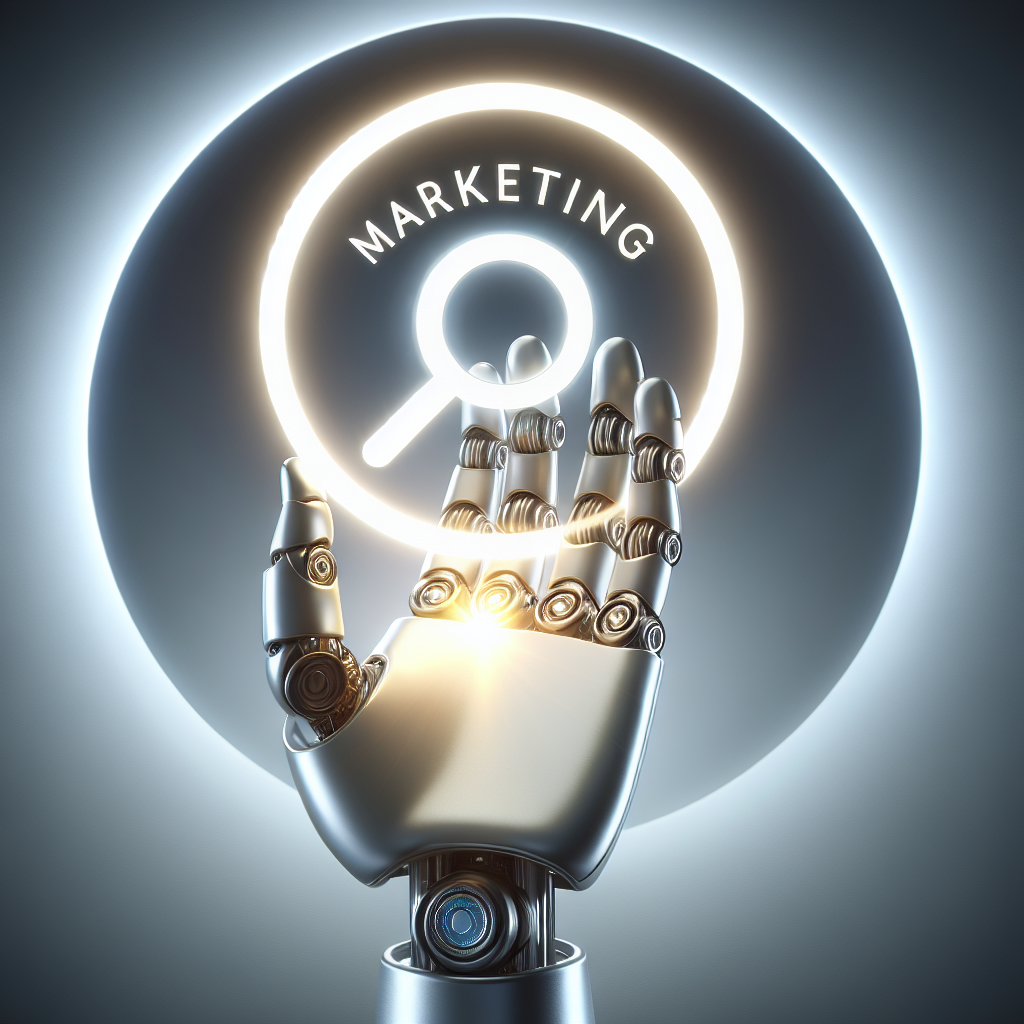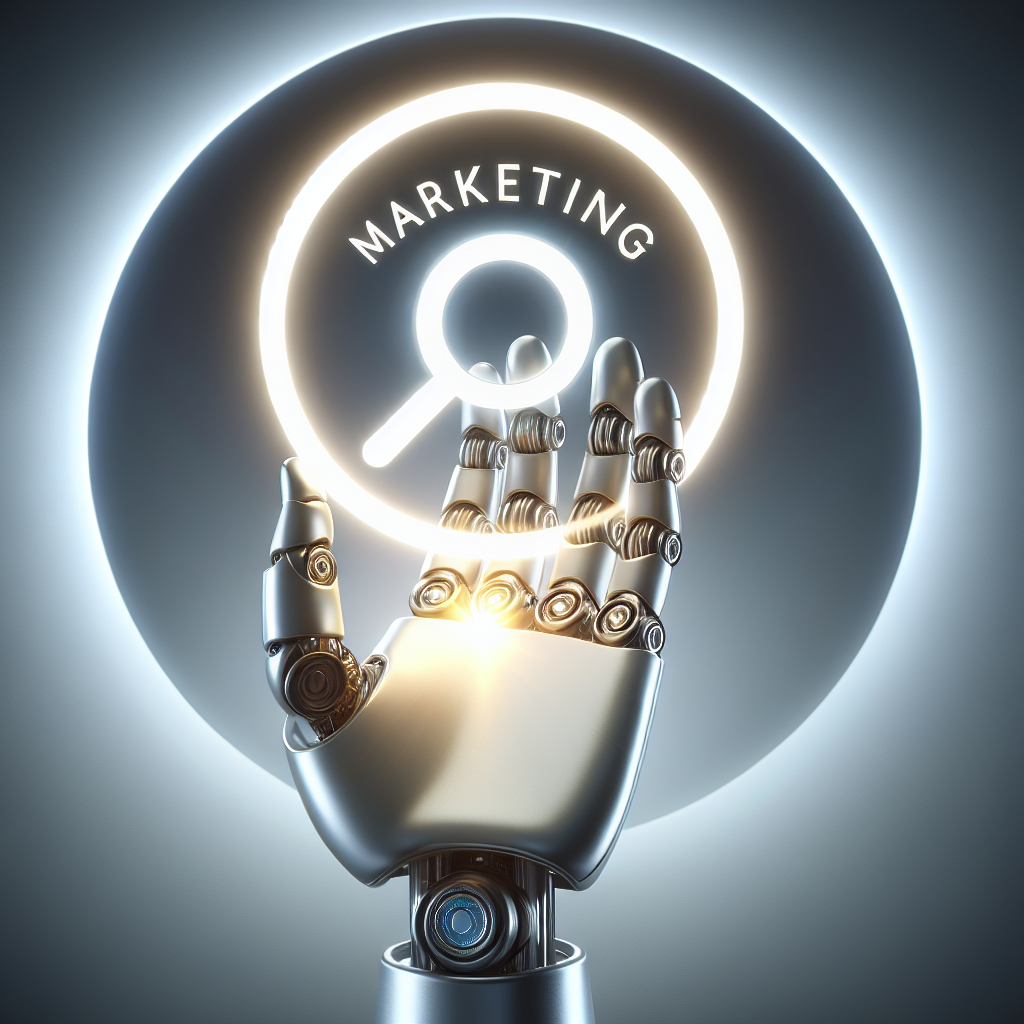In the ever-evolving world of marketing, Artificial Intelligence (AI) has emerged as a powerful tool, revolutionizing the way businesses connect with their audiences and drive success. With the capability to analyze data at unprecedented speed and depth, AI is transforming the landscape of marketing strategies, enabling marketers to make smarter decisions, personalize customer experiences, optimize campaigns, and ultimately, achieve remarkable results. From chatbots that seamlessly engage with consumers to predictive analytics that anticipate buyer behavior, AI is not just a buzzword, but a force shaping the future of marketing.

Personalization and Customer Segmentation
Tailoring marketing messages
In today’s competitive market, it is crucial for businesses to stand out and connect with their target audience effectively. AI plays a significant role in achieving this goal through personalized marketing messages. By utilizing machine learning algorithms, AI can analyze vast amounts of data and gather insights about customer preferences, behaviors, and past interactions. With this information, businesses can create tailored marketing messages that resonate with each individual customer, increasing the chances of engagement and conversion.
Creating personalized recommendations
AI also enables businesses to create personalized recommendations for their customers. Through advanced algorithms, AI systems can analyze customer data, such as purchase history, browsing patterns, and click-through rates, to understand their preferences and interests. Based on this information, AI can make accurate recommendations that match the individual customer’s needs and preferences. Personalized recommendations not only enhance the customer experience but also increase the likelihood of cross-selling and upselling, ultimately driving revenue growth.
Segmenting customers based on their behavior
Customer segmentation is a vital aspect of marketing strategy, as it helps businesses target specific groups of customers with tailored messages and offers. AI leverages complex algorithms to identify patterns in customer behavior and preferences, allowing businesses to segment their customer base effectively. By grouping customers based on similarities, such as demographics, purchase history, and preferences, businesses can create targeted marketing campaigns that are more likely to resonate with each segment. This approach improves targeting accuracy, leading to higher engagement rates and conversion rates.
Chatbots and Customer Service
Automating customer support
AI-powered chatbots have revolutionized customer service by automating support processes. Chatbots enable businesses to provide instant assistance to customers, answering frequently asked questions, resolving simple issues, and even helping with transactions. By automating repetitive tasks, businesses can free up resources and staff to focus on more complex customer inquiries. Moreover, chatbots can operate 24/7, ensuring round-the-clock support for customers, leading to improved customer satisfaction and loyalty.
Providing instant responses
One of the main advantages of chatbots is their ability to provide instant responses to customer queries. With AI, chatbots can analyze customer inquiries and provide accurate and relevant answers promptly. This real-time interaction creates a seamless and efficient customer service experience, reducing response time and enhancing customer satisfaction. Furthermore, chatbots’ ability to remember past conversations allows them to provide personalized responses, making customers feel valued and understood.
Enhancing user experience
AI-powered chatbots not only resolve customer queries but also contribute to enhancing the overall user experience. By analyzing customer interactions, AI can identify areas for improvement and provide valuable insights to businesses. This information can be used to optimize website interfaces, streamline processes, and address pain points experienced by customers. By continuously improving the user experience, businesses can build strong customer relationships, foster loyalty, and drive positive word-of-mouth recommendations.
Content Creation and Optimization
Generating content using AI
AI has made significant advancements in the field of content creation. With natural language processing capabilities, AI algorithms can generate high-quality written content, such as blog posts, articles, and product descriptions. By analyzing existing content and understanding the desired tone and style, AI can create original content that is indistinguishable from human-generated content. This technology not only saves time and resources but also enables businesses to consistently produce engaging and valuable content for their audience.
Optimizing content for better results
AI can also optimize content to improve its visibility and reach. By analyzing search engine trends, user behavior, and keyword data, AI can identify opportunities for content optimization. This includes optimizing meta tags, headings, and content structure to improve search engine rankings and increase organic visibility. AI can also optimize content for different platforms, such as social media and email, ensuring that the message resonates with the target audience and drives desired actions.
Improving SEO with AI
AI has revolutionized search engine optimization (SEO) by providing actionable insights and recommendations. AI algorithms can analyze website data, user behavior, and search engine algorithms to identify opportunities for SEO improvement. By optimizing website structure, content, and technical aspects, businesses can enhance their organic search visibility and attract relevant traffic. AI also enables businesses to monitor keyword rankings, competitor performance, and industry trends, allowing them to make data-driven decisions and stay ahead in the SEO game.
Predictive Analytics and Lead Scoring
Predicting customer behavior
AI excels in predictive analytics, enabling businesses to anticipate customer behavior and needs. By analyzing historical customer data and using machine learning algorithms, AI can identify patterns and trends that indicate future actions. This allows businesses to predict customer preferences, purchase likelihood, and even customer churn. With these insights, businesses can proactively tailor their marketing strategies, product offerings, and customer experiences to maximize engagement and profitability.
Identifying potential leads
Lead generation is a vital component of marketing, and AI can greatly enhance this process. By analyzing vast amounts of data, such as customer behavior, demographics, and interactions, AI algorithms can identify potential leads with a high likelihood of conversion. AI can detect patterns and behaviors that indicate interest and buying intent, allowing businesses to prioritize and target the most promising leads. This saves time and resources while maximizing the effectiveness of lead generation efforts.
Scoring leads for effective targeting
Lead scoring is an effective technique to prioritize and target leads based on their likelihood to convert. AI algorithms can analyze various factors, such as lead demographics, behavior, and engagement levels, to assign a score that represents their potential value. By scoring leads, businesses can focus their resources on high-value leads, improving conversion rates and marketing ROI. Additionally, AI-powered lead scoring enables businesses to continuously refine and update lead scoring models based on real-time data, ensuring that they stay relevant and effective.

Data Analysis and Insights
Processing large datasets
As businesses collect and generate increasingly large volumes of data, AI becomes essential for efficient data analysis. AI algorithms can quickly process and analyze vast amounts of data, uncovering valuable insights and patterns that would be difficult to identify manually. This ability to handle big data enables businesses to gain a holistic understanding of their customers, performance, and market dynamics, leading to more informed decision-making and strategy formulation.
Gaining actionable insights
The true value of AI lies in its ability to provide actionable insights from analyzed data. By leveraging machine learning algorithms, AI can identify trends, correlations, and patterns in data that may not be apparent to human analysts. These insights can include customer preferences, market trends, and performance indicators that businesses can use to optimize their strategies and operations. With AI-powered insights, businesses can make data-driven decisions and maximize their marketing effectiveness.
Improving decision-making
AI’s data analysis capabilities empower businesses to make informed decisions across various aspects of marketing. By synthesizing and analyzing data from multiple sources, AI can provide comprehensive insights that guide decision-making. For example, AI can assess the effectiveness of past marketing campaigns, identify areas of improvement, and recommend strategies for future campaigns. This data-driven decision-making minimizes guesswork and helps businesses allocate their resources and efforts more effectively, ultimately driving positive results.
Dynamic Pricing and Revenue Management
Optimizing pricing strategies
AI enables businesses to optimize their pricing strategies by analyzing market trends, competitor pricing, and customer behavior. By leveraging real-time data, AI algorithms can dynamically adjust prices to match demand, competition, and customer willingness to pay. Dynamic pricing ensures that businesses maximize their revenue potential while remaining competitive in the market. AI can also help identify pricing sweet spots, offering insights into price elasticity and customer sensitivity to price changes.
Adjusting pricing in real-time
With AI, businesses can dynamically adjust prices in real-time based on various factors, such as inventory levels, demand patterns, and competitor pricing. This real-time adjustment improves responsiveness to market changes and allows businesses to capture sales opportunities more effectively. By leveraging AI algorithms, businesses can set rules and triggers that automatically update prices based on predefined conditions, ensuring optimal pricing at all times.
Maximizing revenue
Dynamic pricing and revenue management, driven by AI, can significantly impact a business’s bottom line. By optimizing pricing strategies and adjusting prices in real-time, businesses can maximize their revenue potential. AI algorithms can analyze large amounts of data, such as historical sales, customer behavior, and market conditions, to identify revenue optimization opportunities. This data-driven approach ensures that businesses make informed decisions, reduce revenue leakage, and achieve their revenue goals.
Ad Targeting and Personalized Advertising
Delivering targeted ads
AI has transformed ad targeting by enabling businesses to deliver highly targeted advertisements to their audience. By analyzing vast amounts of customer data, AI algorithms can identify precise targeting criteria, such as demographics, interests, and purchasing behavior. This allows businesses to create ad campaigns that reach the right audience at the right time, increasing the chances of engagement and conversion. The ability to target ads effectively enhances ad campaign performance, ROI, and overall marketing effectiveness.
Customizing ads based on user behavior
AI can personalize ad content based on user behavior and interactions. By leveraging machine learning algorithms, AI can analyze user data, such as browsing history, preferences, and past interactions, to understand individual interests and preferences. With this information, businesses can customize ad content, such as images, messages, and offers, to match each user’s preferences. Personalized ads not only grab the attention of users but also create a more relevant and engaging ad experience, increasing the likelihood of conversion.
Optimizing ad campaigns
AI-powered tools help businesses optimize their ad campaigns for better results. By analyzing campaign data, AI algorithms can identify trends, patterns, and factors that contribute to ad performance. This includes factors such as ad placement, timing, messaging, and creative elements. AI can provide valuable insights and recommendations to improve ad campaign effectiveness, increase click-through rates, and maximize conversion rates. This data-driven optimization ensures that businesses get the most out of their advertising investments.
Social Media Listening and Sentiment Analysis
Monitoring social media conversations
Social media has become a powerful platform for businesses to connect with their audience. AI enables businesses to track and monitor social media conversations related to their brand, products, and industry. AI algorithms can analyze vast amounts of social media data in real-time, identifying mentions, hashtags, and discussions relevant to the business. This social media listening helps businesses to stay updated on customer sentiments, emerging trends, and potential opportunities or threats.
Analyzing sentiment and feedback
AI algorithms can go beyond monitoring social media conversations and analyze the sentiment and feedback expressed by customers. By using natural language processing techniques, AI can understand the sentiment behind social media posts, comments, and reviews. This sentiment analysis allows businesses to gauge customer satisfaction, identify areas for improvement, and address negative sentiment proactively. By acting on the feedback received through social media, businesses can improve their products, services, and overall customer experience.
Managing online reputation
AI plays a crucial role in managing online reputation by monitoring, analyzing, and responding to online conversations. By understanding sentiment, identifying key influencers, and detecting potential reputation risks, AI algorithms can alert businesses to emerging issues. This allows businesses to respond promptly and appropriately, minimizing reputational damage and maintaining a positive brand image. AI tools also enable businesses to automate the process of responding to customer inquiries and comments on social media, ensuring efficient and consistent communication.
Email Marketing Automation
Automated email campaigns
AI-powered email marketing automation platforms enable businesses to deliver targeted and personalized email campaigns at scale. By analyzing customer data, such as demographics, behavior, and preferences, AI algorithms can segment email lists and create automated email campaigns tailored to each segment. These campaigns can include personalized recommendations, abandoned cart reminders, and triggered emails based on customer actions. By automating the email marketing process, businesses can save time, improve efficiency, and maximize the effectiveness of their email marketing efforts.
Personalized email content
AI enables businesses to create personalized email content that resonates with individual customers. By leveraging customer data and machine learning algorithms, AI can generate email content tailored to each customer’s preferences, interests, and purchase history. Personalized emails improve engagement rates, click-through rates, and conversion rates. Moreover, by continuously analyzing customer interactions and responses, AI can optimize email content in real-time, ensuring that it remains relevant and effective.
Segmenting email lists
AI algorithms can analyze customer data to segment email lists effectively. By grouping customers based on demographics, behavior, and preferences, businesses can create targeted email campaigns that deliver relevant content to each segment. This personalized approach increases the chances of engagement and conversion. AI can also dynamically update email lists based on customer behavior, ensuring that customers receive the most relevant emails based on their current interests and needs.
Voice Search Optimization
Optimizing for voice-based queries
With the rise of voice assistants and smart speakers, optimizing for voice-based queries has become crucial. AI helps businesses optimize their websites and content to rank higher in voice search results. By analyzing data on voice search queries, intent, and user behavior, AI algorithms can provide insights on the specific language, phrases, and questions users typically use in voice searches. This information helps businesses optimize their content and website structure to align with voice search preferences and improve their visibility.
Using natural language processing
AI-powered natural language processing (NLP) technologies enable businesses to understand and respond to voice-based queries effectively. NLP algorithms can interpret spoken language, understand user intent, and provide accurate responses. By leveraging NLP, businesses can create conversational experiences that mimic human interactions, delivering relevant and engaging responses to voice-based queries. This enhances the user experience and increases the chances of customer satisfaction and loyalty.
Improving voice search rankings
AI plays a critical role in improving voice search rankings by optimizing content and website factors. Through AI-driven analysis of voice search trends and user behavior, businesses can identify opportunities to optimize their content for voice-based queries. This includes incorporating natural language and long-tail keywords, enhancing website speed and mobile-friendliness, and structuring content to provide concise and accurate answers to common voice search queries. By optimizing for voice search, businesses can improve their visibility and attract valuable voice-based traffic.
In conclusion, AI offers numerous opportunities for businesses to enhance their marketing efforts. From personalizing marketing messages and creating tailored recommendations to optimizing content, improving customer service, and analyzing data for actionable insights, AI empowers businesses to deliver relevant and engaging experiences to their customers. With AI’s ability to automate processes, improve targeting accuracy, and optimize strategies based on data-driven insights, businesses can gain a competitive edge and drive growth in today’s dynamic market. Embracing AI in marketing is not only a competitive advantage but also a strategic imperative for businesses looking to thrive in the digital age.
